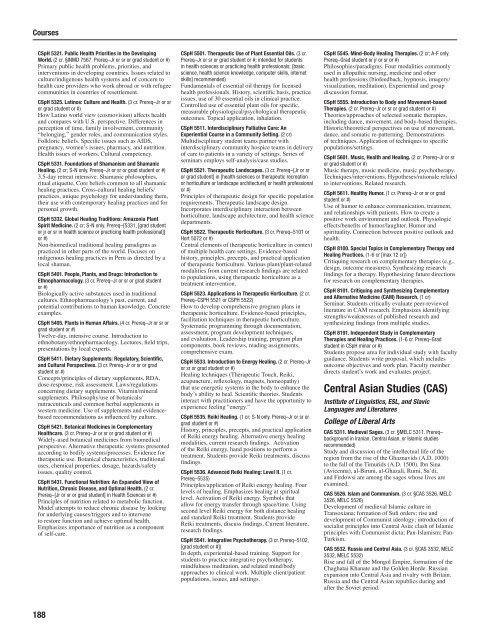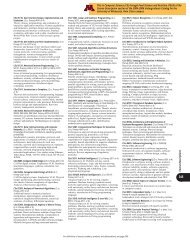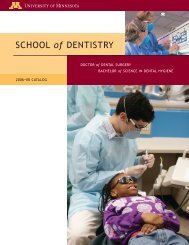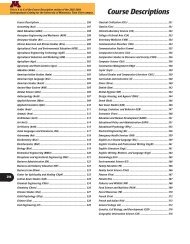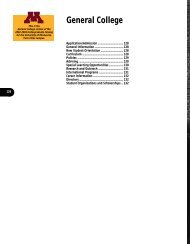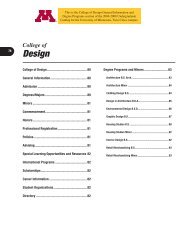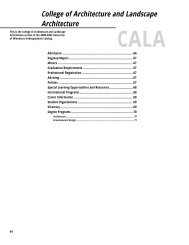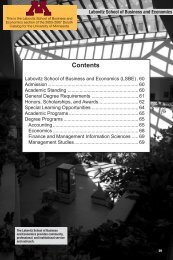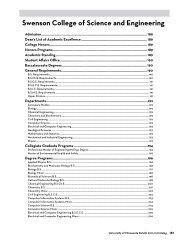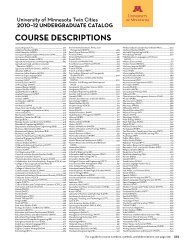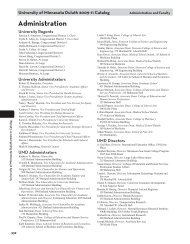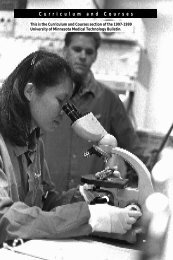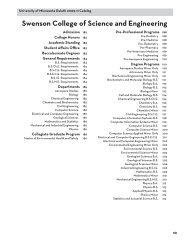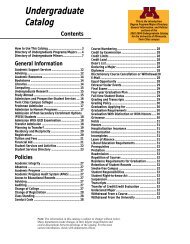Accounting through Education and Human Development - University ...
Accounting through Education and Human Development - University ...
Accounting through Education and Human Development - University ...
Create successful ePaper yourself
Turn your PDF publications into a flip-book with our unique Google optimized e-Paper software.
Courses<br />
CSpH 5321. Public Health Priorities in the Developing<br />
World. (2 cr. §INMD 7567. Prereq–Jr or sr or grad student or #)<br />
Primary public health problems, priorities, <strong>and</strong><br />
interventions in developing countries. Issues related to<br />
culture/indigenous health systems <strong>and</strong> of concern to<br />
health care providers who work abroad or with refugee<br />
communities in countries of resettlement.<br />
CSpH 5325. Latinos: Culture <strong>and</strong> Health. (3 cr. Prereq–Jr or sr<br />
or grad student or #)<br />
How Latino world view (cosmovision) affects health<br />
<strong>and</strong> compares with U.S. perspective. Differences in<br />
perception of time, family involvement, community<br />
“belonging,” gender roles, <strong>and</strong> communication styles.<br />
Folkloric beliefs. Specific issues such as AIDS,<br />
pregnancy, womenʼs issues, pharmacy, <strong>and</strong> nutrition.<br />
Health issues of workers. Cultural competency.<br />
CSpH 5331. Foundations of Shamanism <strong>and</strong> Shamanic<br />
Healing. (2 cr; S-N only. Prereq–Jr or sr or grad student or #)<br />
3.5-day retreat intensive. Shamanic philosophies,<br />
ritual etiquette, Core beliefs common to all shamanic<br />
healing practices. Cross-cultural healing beliefs/<br />
practices, unique psychology for underst<strong>and</strong>ing them,<br />
their use with contemporary healing practices <strong>and</strong> for<br />
personal growth.<br />
CSpH 5332. Global Healing Traditions: Amazonia Plant<br />
Spirit Medicine. (2 cr; S-N only. Prereq–[5331, [grad student<br />
or jr or sr in health science or practicing health professional]]<br />
or #)<br />
Non-biomedical traditional healing paradigms as<br />
practiced in other parts of the world. Focuses on<br />
indigenous healing practices in Peru as directed by a<br />
local shaman.<br />
CSpH 5401. People, Plants, <strong>and</strong> Drugs: Introduction to<br />
Ethnopharmacology. (3 cr. Prereq–Jr or sr or grad student<br />
or #)<br />
Biologically active substances used in traditional<br />
cultures. Ethnopharmacologyʼs past, current, <strong>and</strong><br />
potential contributions to human knowledge. Concrete<br />
examples.<br />
CSpH 5405. Plants in <strong>Human</strong> Affairs. (4 cr. Prereq–Jr or sr or<br />
grad student or #)<br />
Twelve-day, intensive course. Introduction to<br />
ethnobotany/ethnopharmacology. Lectures, field trips,<br />
presentations by local experts.<br />
CSpH 5411. Dietary Supplements: Regulatory, Scientific,<br />
<strong>and</strong> Cultural Perspectives. (3 cr. Prereq–Jr or sr or grad<br />
student or #)<br />
Concepts/principles of dietary supplements, RDA,<br />
dose-response, risk assessment. Laws/regulations<br />
concerning dietary supplements. Vitamin/mineral<br />
supplements. Philosophy/use of botanicals/<br />
nutraceuticals <strong>and</strong> common herbal supplements in<br />
western medicine. Use of supplements <strong>and</strong> evidencebased<br />
recommendations as influenced by culture.<br />
CSpH 5421. Botanical Medicines in Complementary<br />
Healthcare. (3 cr. Prereq–Jr or sr or grad student or #)<br />
Widely-used botanical medicines from biomedical<br />
perspective. Alternative therapeutic systems presented<br />
according to bodily systems/processes. Evidence for<br />
therapeutic use. Botanical characteristics, traditional<br />
uses, chemical properties, dosage, hazards/safety<br />
issues, quality control.<br />
CSpH 5431. Functional Nutrition: An Exp<strong>and</strong>ed View of<br />
Nutrition, Chronic Disease, <strong>and</strong> Optimal Health. (2 cr.<br />
Prereq–[Jr or sr or grad student] in Health Sciences or #)<br />
Principles of nutrition related to metabolic function.<br />
Model attempts to reduce chronic disease by looking<br />
for underlying causes/triggers <strong>and</strong> to intervene<br />
to restore function <strong>and</strong> achieve optimal health.<br />
Emphasizes importance of nutrition as a component<br />
of self-care.<br />
CSpH 5501. Therapeutic Use of Plant Essential Oils. (3 cr.<br />
Prereq–Jr or sr or grad student or #; intended for students<br />
in health sciences or practicing health professionals; [basic<br />
science, health science knowledge, computer skills, internet<br />
skills] recommended)<br />
Fundamentals of essential oil therapy for licensed<br />
health professionals. History, scientific basis, practice<br />
issues, use of 30 essential oils in clinical practice.<br />
Controlled use of essential plant oils for specific,<br />
measurable physiological/psychological therapeutic<br />
outcomes. Topical application, inhalation.<br />
CSpH 5511. Interdisciplinary Palliative Care: An<br />
Experiential Course in a Community Setting. (2 cr)<br />
Multidisciplinary student teams partner with<br />
interdisciplinary community hospice teams in delivery<br />
of care to patients in a variety of settings. Series of<br />
seminars employs self-analysis/case studies.<br />
CSpH 5521. Therapeutic L<strong>and</strong>scapes. (3 cr. Prereq–[Jr or sr<br />
or grad student] in [health sciences or therapeutic recreation<br />
or horticulture or l<strong>and</strong>scape architecture] or health professional<br />
or #)<br />
Principles of therapeutic design for specific population<br />
requirements. Therapeutic l<strong>and</strong>scape design.<br />
Incorporates interdisciplinary interaction between<br />
horticulture, l<strong>and</strong>scape architecture, <strong>and</strong> health science<br />
departments.<br />
CSpH 5522. Therapeutic Horticulture. (3 cr. Prereq–5101 or<br />
Hort 5072 or #)<br />
Central elements of therapeutic horticulture in context<br />
of multiple health care settings. Evidence-based<br />
history, principles, precepts, <strong>and</strong> practical application<br />
of therapeutic horticulture. Various plant/plant-related<br />
modalities from current research findings are related<br />
to populations, using therapeutic horticulture as a<br />
treatment intervention.<br />
CSpH 5523. Applications in Therapeutic Horticulture. (2 cr.<br />
Prereq–CSPH 5521 or CSPH 5522)<br />
How to develop comprehensive program plans in<br />
therapeutic horticulture. Evidence-based principles,<br />
facilitation techniques in therapeutic horticulture.<br />
Systematic programming <strong>through</strong> documentation,<br />
assessment, program development techniques,<br />
<strong>and</strong> evaluation. Leadership training, program plan<br />
components, book reviews, reading assignments,<br />
comprehensive exam.<br />
CSpH 5533. Introduction to Energy Healing. (2 cr. Prereq–Jr<br />
or sr or grad student or #)<br />
Healing techniques (Therapeutic Touch, Reiki,<br />
acupuncture, reflexology, magnets, homeopathy)<br />
that use energetic systems in the body to enhance the<br />
bodyʼs ability to heal. Scientific theories. Students<br />
interact with practitioners <strong>and</strong> have the opportunity to<br />
experience feeling “energy.”<br />
CSpH 5535. Reiki Healing. (1 cr; S-N only. Prereq–Jr or sr or<br />
grad student or #)<br />
History, principles, precepts, <strong>and</strong> practical application<br />
of Reiki energy healing. Alternative energy healing<br />
modalities, current research findings. Activation<br />
of the Reiki energy, h<strong>and</strong> positions to perform a<br />
treatment. Students provide Reiki treatments, discuss<br />
findings.<br />
CSpH 5536. Advanced Reiki Healing: Level II. (1 cr.<br />
Prereq–5535)<br />
Principles/application of Reiki energy healing. Four<br />
levels of healing. Emphasizes healing at spiritual<br />
level. Activation of Reiki energy. Symbols that<br />
allow for energy transfer <strong>through</strong> space/time. Using<br />
second level Reiki energy for both distance healing<br />
<strong>and</strong> st<strong>and</strong>ard Reiki treatment. Students provide<br />
Reiki treatments, discuss findings. Current literature,<br />
research findings.<br />
CSpH 5541. Integrative Psychotherapy. (3 cr. Prereq–5102,<br />
[grad student or #])<br />
In depth, experiential-based training. Support for<br />
students to practice integrative psychotherapy,<br />
mindfulness meditation, <strong>and</strong> related mind/body<br />
approaches to clinical work. Multiple client/patient<br />
populations, issues, <strong>and</strong> settings.<br />
CSpH 5545. Mind-Body Healing Therapies. (2 cr; A-F only.<br />
Prereq–Grad student or jr or sr or #)<br />
Philosophies/paradigms. Four modalities commonly<br />
used in allopathic nursing, medicine <strong>and</strong> other<br />
health professions (biofeedback, hypnosis, imagery/<br />
visualization, meditation). Experiential <strong>and</strong> group<br />
discussion format.<br />
CSpH 5555. Introduction to Body <strong>and</strong> Movement-based<br />
Therapies. (2 cr. Prereq–Jr or sr or grad student or #)<br />
Theories/approaches of selected somatic therapies,<br />
including dance, movement, <strong>and</strong> body-based therapies.<br />
Historic/theoretical perspectives on use of movement,<br />
dance, <strong>and</strong> somatic re-patterning. Demonstrations<br />
of techniques. Application of techniques to specific<br />
populations/settings.<br />
CSpH 5601. Music, Health <strong>and</strong> Healing. (2 cr. Prereq–Jr or sr<br />
or grad student or #)<br />
Music therapy, music medicine, music psychotherapy.<br />
Techniques/interventions. Hypotheses/rationale related<br />
to interventions. Related research.<br />
CSpH 5611. Healthy Humor. (1 cr. Prereq–Jr or sr or grad<br />
student or #)<br />
Use of humor to enhance communication, treatment,<br />
<strong>and</strong> relationships with patients. How to create a<br />
positive work environment <strong>and</strong> outlook. Physiologic<br />
effects/benefits of humor/laughter. Humor <strong>and</strong><br />
spirituality. Connection between positive outlook <strong>and</strong><br />
health.<br />
CSpH 8100. Special Topics in Complementary Therapy <strong>and</strong><br />
Healing Practices. (1-6 cr [max 12 cr])<br />
Critiquing research on complementary therapies (e.g.,<br />
design, outcome measures). Synthesizing research<br />
findings for a therapy. Hypothesizing future directions<br />
for research on complementary therapies.<br />
CSpH 8101. Critiquing <strong>and</strong> Synthesizing Complementary<br />
<strong>and</strong> Alternative Medicine (CAM) Research. (1 cr)<br />
Seminar. Students critically evaluate peer-reviewed<br />
literature in CAM research. Emphasizes identifying<br />
strengths/weaknesses of published research <strong>and</strong><br />
synthesizing findings from multiple studies.<br />
CSpH 8191. Independent Study in Complementary<br />
Therapies <strong>and</strong> Healing Practices. (1-6 cr. Prereq–Grad<br />
student in CSpH minor or #)<br />
Students propose area for individual study with faculty<br />
guidance. Students write proposal, which includes<br />
outcome objectives <strong>and</strong> work plan. Faculty member<br />
directs studentʼs work <strong>and</strong> evaluates project.<br />
Central Asian Studies (CAS)<br />
Institute of Linguistics, ESL, <strong>and</strong> Slavic<br />
Languages <strong>and</strong> Literatures<br />
College of Liberal Arts<br />
CAS 5311. Medieval Sages. (3 cr. §MELC 5311. Prereq–<br />
background in Iranian, Central Asian, or Islamic studies<br />
recommended)<br />
Study <strong>and</strong> discussion of the intellectual life of the<br />
region from the rise of the Ghaznavids (A.D. 1000)<br />
to the fall of the Timurids (A.D. 1500). Ibn Sina<br />
(Avicenna), al-Biruni, al-Ghazali, Rumi, Saʼdi,<br />
<strong>and</strong> Firdowsi are among the sages whose lives are<br />
examined.<br />
CAS 5526. Islam <strong>and</strong> Communism. (3 cr. §CAS 3526, MELC<br />
3526, MELC 5526)<br />
<strong>Development</strong> of medieval Islamic culture in<br />
Transoxiana; formation of Sufi orders; rise <strong>and</strong><br />
development of Communist ideology; introduction of<br />
socialist principles into Central Asia; clash of Islamic<br />
principles with Communist dicta; Pan-Islamism; Pan-<br />
Turkism.<br />
CAS 5532. Russia <strong>and</strong> Central Asia. (3 cr. §CAS 3532, MELC<br />
3532, MELC 5532)<br />
Rise <strong>and</strong> fall of the Mongol Empire, formation of the<br />
Chaghatai Khanate <strong>and</strong> the Golden Horde. Russian<br />
expansion into Central Asia <strong>and</strong> rivalry with Britain.<br />
Russia <strong>and</strong> the Central Asian republics during <strong>and</strong><br />
after the Soviet period.<br />
188


